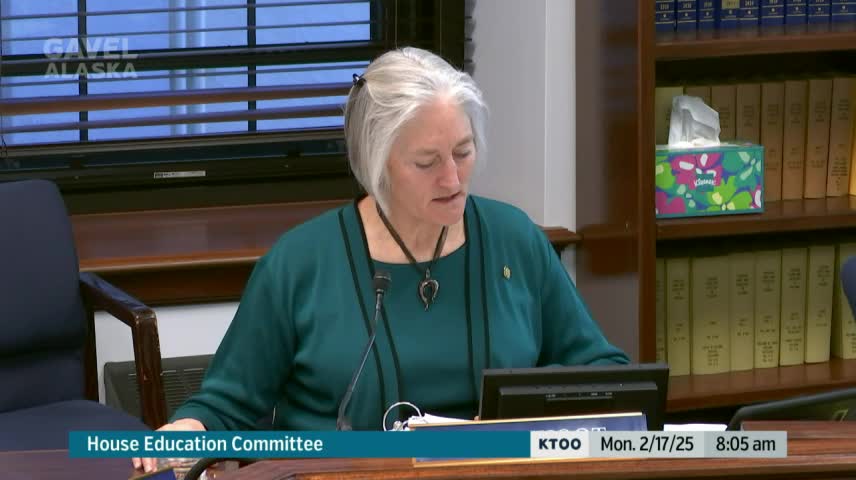House Education Committee hears "Come Back Home" student loan repayment pilot; amendment deadline set
Get AI-powered insights, summaries, and transcripts
Subscribe
Summary
House Education Committee Co-Chair Andy Story brought forward House Bill 28 on Feb. 17, 2025, proposing a three‑year pilot to pay up to $8,000 per year (maximum $24,000) toward the student loans of former Alaskans who return to work as full‑time public school teachers or state employees.
House Education Committee Co-Chair Andy Story brought forward House Bill 28 on Feb. 17, 2025, proposing a three‑year pilot to pay up to $8,000 per year (maximum $24,000) toward the student loans of former Alaskans who return to work as full‑time public school teachers or state employees.
The bill would have the Alaska Commission on Postsecondary Education (ACPE) develop and administer the pilot, with awards limited to applicants who were Alaska residents before attending an out‑of‑state institution or who earned a degree or certificate from the University of Alaska system and subsequently lived outside the state for at least 12 months. ACPE would require participants to refinance their loans through the commission; grants would be payable only after completion of each year of service. According to the bill text read into the record, “participants may receive a grant each year for a maximum of 3 years in an amount not to exceed $8,000 per year,” with up to 25 grants awarded in a fiscal year and a statutory cap of $1,000,000 per fiscal year.
The committee heard a fiscal presentation from Representative Story’s staff member Sherry Bowman and from ACPE Acting Executive Director Carrie Thomas, who said ACPE has 52 employees and estimated the program would require roughly a third of a full‑time position in year one and about a quarter of a position in year two to administer the pilot. The fiscal note read into the record identified an implementation cost in fiscal year 2026 of $1,045,000 (including $1,000,000 for grants and administrative costs), with lower administrative costs in subsequent years. Co‑Chair Story clarified during the hearing that the bill envisions funding from the Higher Education Investment Fund.
Committee members probed eligibility and scope. Representative Eisheid asked why the bill caps awards at 25 recipients; Story replied the cap derives from a $1,000,000 annual funding limit and the proposed $24,000 maximum award per participant over three years. Representative Eisheid and others asked whether school nurses and other non‑teacher personnel would qualify; Story said the intent is to target certified teachers and that nurses currently would not be covered under the bill’s language. Carrie Thomas and Story also confirmed the pilot would include state employees who hold certificates as well as those with two‑ or four‑year degrees, and that ACPE would report to the Legislature annually and provide a final evaluation when the pilot ends in 2027.
Invited testimony included ACPE Acting Executive Director Carrie Thomas, who described repayment programs as an employer‑sponsored benefit distinct from loan forgiveness and said such programs can be less costly to administer than forgiveness programs. Thomas summarized research cited in the hearing: “A recent study found employers offering student loan repayment retain employees 36% longer than others,” and she told the committee ACPE would provide the required reports if the pilot proceeds. Terry Fagerstrom, a retired state employee and former recipient of an earlier Alaska loan forgiveness program, gave personal testimony describing how loan relief influenced a decision to return to Alaska and remain in state service.
Representatives of Alaska education organizations testified in support. Lon Garrison, executive director of the Association of Alaska School Boards, said, “HB 28 offers a practical solution and an incentive program that encourages these skilled professionals to come home and serve Alaska communities and students.” Dr. Lisa Paradis, executive director of the Alaska Council of School Administrators, said her organization “strongly support[s] this bill” and emphasized that the pilot is one step among many strategies to address recruitment and retention challenges in Alaska schools.
Committee members requested additional detail from state agencies on vacancy rates and on the long‑term health of the Higher Education Investment Fund. ACPE deferred final fiscal‑health analysis to the Department of Revenue, which the committee asked to provide follow‑up information. Members also requested the study source supporting the retention statistic cited by ACPE.
The committee set an amendment deadline of noon on Feb. 24, 2025, and Co‑Chair Rebecca Himshute announced the committee would hold over House Bill 28 for further work. The hearing record contains no final vote on the bill.
Votes at this hearing: no committee vote was taken on House Bill 28; the bill was held over and an amendment deadline was set for noon Feb. 24, 2025.
